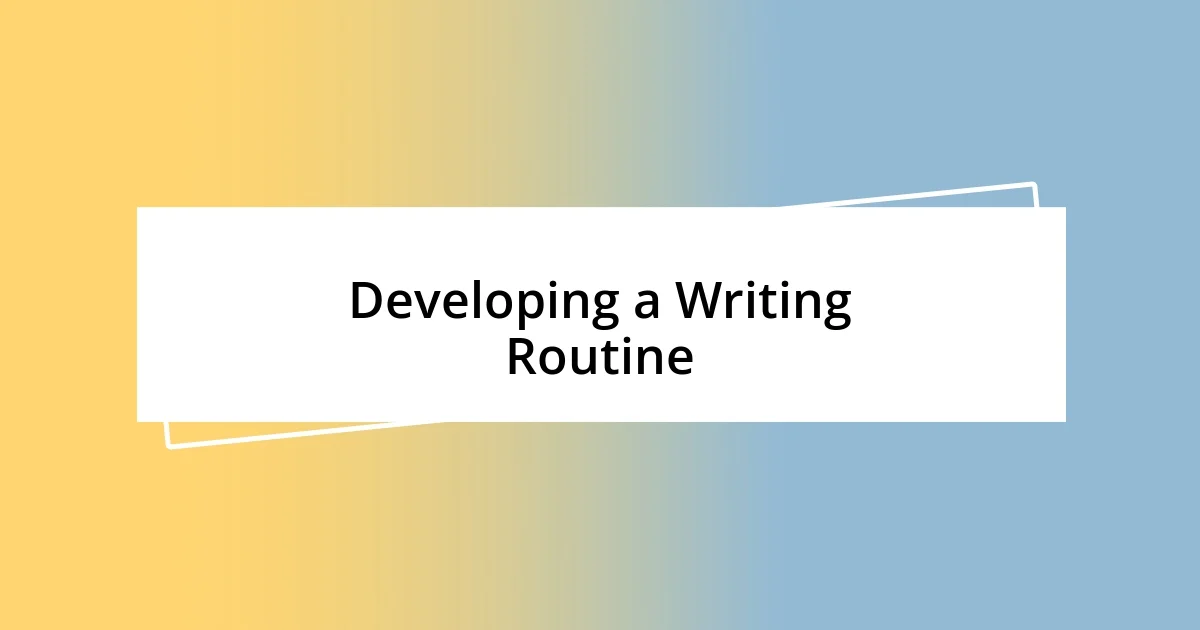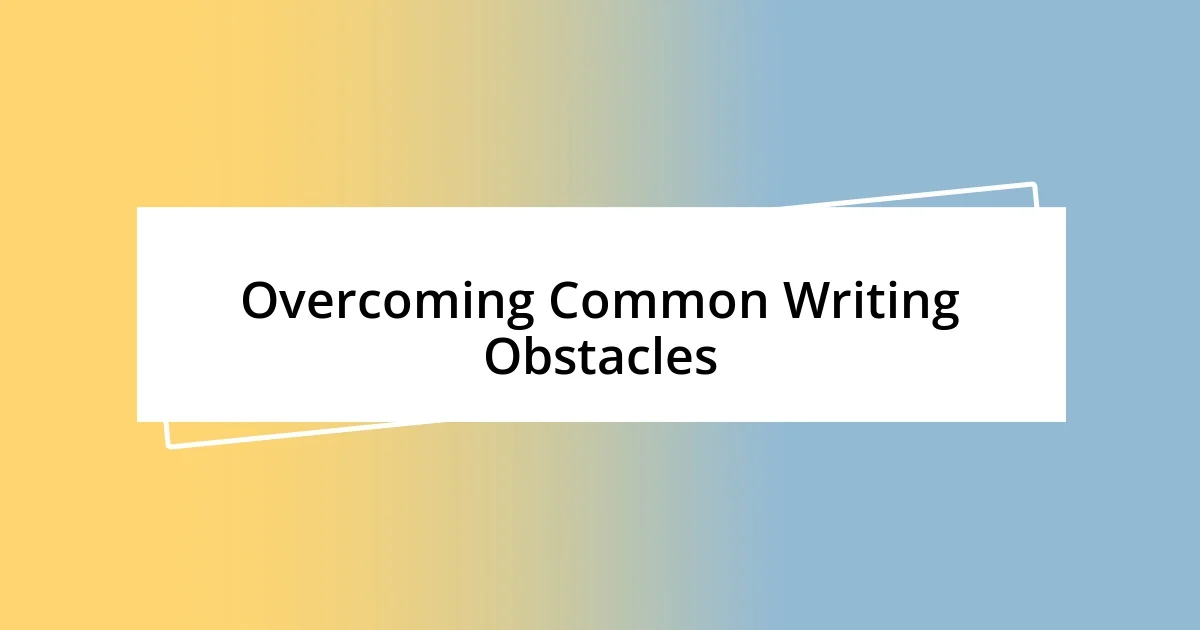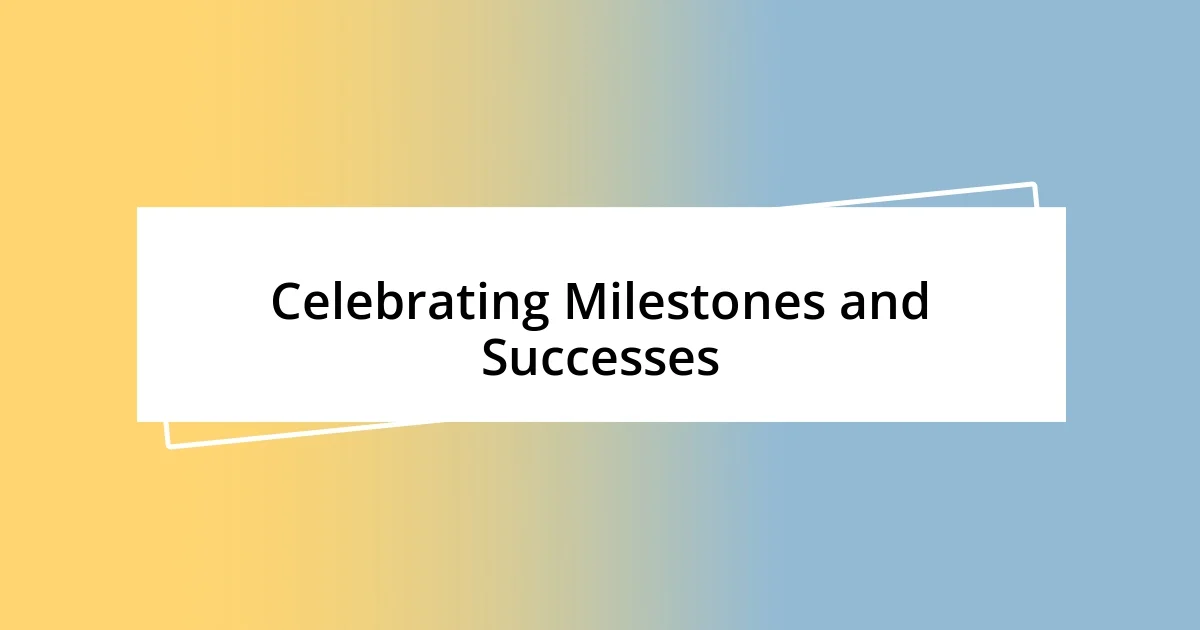Key takeaways:
- Understanding writing motivation involves connecting emotionally with one’s experiences and persistence through setbacks, emphasizing the importance of small, achievable goals.
- Building a writing routine with time management, a conducive environment, and flexibility can significantly enhance the writing process and creativity.
- Seeking feedback, networking with other writers, and celebrating milestones contribute to personal growth and motivation in the writing journey.

Understanding Writing Motivation
Understanding writing motivation can often feel like unraveling a complex puzzle. I remember sitting in my favorite coffee shop, the aroma of fresh brew swirling around me, and thinking, “What truly drives me to write?” It wasn’t just the desire to convey information; there was something deeper—an urge to share my experiences and connect with others on an emotional level. Have you ever experienced that spark when a thought aligns perfectly with your feelings? That’s motivation at work.
Sometimes, I find myself reflecting on the moments when my passion for writing winked in and out of existence. I recall a time when I faced rejection after rejection for a piece I poured my heart into. The initial blow stung, and I felt like tossing my pen aside. But then, something clicked. I realized that my motivation wasn’t just about acceptance; it was about sharing my unique voice with the world. Isn’t it fascinating how setbacks can sometimes serve as powerful motivators?
Writing motivation isn’t solely about inspiration; it’s also about persistence. I often ask myself, “What pushes me to keep going even on tough days?” I’ve learned that setting small, achievable goals helps. It leads to incremental victories that boost my confidence. For example, I started writing just 100 words a day. It seemed trivial at first, but those words began to weave together, transforming into meaningful narratives. What tiny steps can you take today to nurture your own motivation?

Developing a Writing Routine
Developing a writing routine has been a game-changer in my journey. I remember the early days when I’d scribble notes randomly, never quite finding my rhythm. It wasn’t until I committed to a dedicated time each day that I noticed significant progress. Setting aside a specific hour each morning created a sacred space for my thoughts to flow, transforming writing from a chore into something I truly looked forward to. Have you ever felt that rush when words come together seamlessly thanks to consistency?
Moreover, I learned the importance of creating a conducive environment. When I shifted my writing space to a cozy nook filled with soft lighting and my favorite books nearby, it sparked creativity. Just as the right playlist can enhance your mood, a comfortable space can elevate your writing experience. Have you explored your own workspace? What elements can you tweak to make it feel more inspiring?
Lastly, I found that flexibility is key in maintaining a writing routine. There were days filled with distractions or unexpected obligations, and I felt the urge to throw in the towel. But instead of giving up, I learned to adapt. I started utilizing snippets of time throughout my day, even jotting down ideas during lunch breaks. This adaptability transformed my approach to writing—a reminder that routines can evolve while still keeping creativity alive.
| Writing Routine Elements | My Experience |
|---|---|
| Time Management | Committing to an hour each day enhanced my focus. |
| Environment Setup | A cozy writing nook sparked my creativity. |
| Flexibility | Utilizing snippets of time kept the flow going. |

Overcoming Common Writing Obstacles
Overcoming common writing obstacles can sometimes feel like a daunting challenge, but I’ve discovered strategies that transform these hurdles into stepping stones. I remember stumbling over writer’s block during a crucial deadline. It was frustrating, each blank page taunting me. Instead of letting despair set in, I changed my approach. I took a walk outside, breathing in fresh air, and by the time I returned, my thoughts flowed with renewed vigor. Have you ever noticed how a little shift in environment can ignite inspiration?
Here are a few tactics I often use:
- Freewriting: Setting a timer for just ten minutes to write without judgment releases pressure.
- Reading for Inspiration: Diving into works by my favorite authors provides a fresh perspective and rekindles my enthusiasm.
- Talking it Out: Sharing my ideas aloud with a friend often clarifies my thoughts and sparks new ones.
- Breaking Tasks Down: I tackle writing in smaller chunks, helping to make the process less overwhelming and more manageable.
- Setting Realistic Goals: I focus on what I can achieve today instead of the daunting end product, allowing me to celebrate small wins.
Every writer faces obstacles, but it’s how we respond that shapes our journey.

Seeking Feedback and Critique
Seeking feedback has been a cornerstone of my growth as a writer. I still remember the first time I shared my work with a writing group. My heart raced as I handed over my pages, and I felt vulnerable, as if I were exposing a part of myself. The rush of anxiety was well worth it; the insights I received helped refine my voice and ideas in ways I couldn’t have achieved alone. Have you ever hesitated to share your work, fearing criticism? I’ve learned that constructive criticism is a powerful tool for improvement.
I’ve found that asking for feedback doesn’t have to come from formal avenues alone. Sometimes, sharing a piece with a close friend or a fellow writer can lead to the most enlightening discussions. I recall showing my rough draft to a friend over coffee. They pointed out not just areas for improvement, but also highlighted what resonated with them. Their perspective opened my eyes to things I had overlooked, reminding me how valuable others’ viewpoints can be. Isn’t it fascinating how a fresh pair of eyes can uncover strengths and areas for growth you might miss?
Critiques can sting, but I’ve learned to embrace them as part of the journey. There have been moments when feedback felt harsh, and my initial reaction was defensive. Nevertheless, I’ve discovered that sitting with that discomfort often leads to clarity. Often, what feels like criticism is just an opportunity for growth. The transformative power of feedback has taught me resilience, motivating me to revise and hone my craft further. How do you handle feedback? I believe it’s a vital part of evolving as a writer.

Building a Writing Network
Building a writing network has been one of the most rewarding aspects of my journey. Whenever I attend writers’ workshops, there’s this electric atmosphere buzzing with creativity. I remember chatting with a fellow writer who was struggling to find her voice. By sharing our challenges and experiences, we not only built a connection but also sparked ideas that helped us both grow. Have you ever found that unexpected conversations can lead to breakthroughs in your writing?
I also make it a point to engage on social media platforms where writers gather. One day, I posted a question in a writing group on Facebook, and the responses flooded in. Some members shared resources, while others offered encouragement. It’s incredible how a simple post can connect you with writers from all over the world, each bringing their unique perspective to the table. Have you ever considered how digital spaces can expand your writing community in ways you never imagined?
In-person events, like book readings or local writing meet-ups, have also played a pivotal role in my networking. I once attended a small gathering where a published author shared her journey. Listening to her story felt like a lightbulb moment. I approached her afterward, and our conversation blossomed into a mentoring relationship. These interactions remind me that every connection holds the potential for growth. Isn’t it amazing how a single conversation can change your writing trajectory?

Marketing Your Written Work
Marketing your written work is a crucial step that often feels daunting. I recall my first experience submitting an article to a magazine—my hands shook as I clicked ‘send.’ But, I quickly learned that taking that leap opens doors to opportunities I hadn’t considered. Have you ever hesitated to share your work out of fear it wouldn’t be well-received? I can assure you, the moment you hit that publish button or send your pitch, you’re not just sharing your work; you’re inviting the world to engage with your voice.
Using social media to promote my writing has been a game changer. One time, I shared a snippet from my latest story on Instagram and was surprised at the flood of responses. Friends, family, and even strangers weighed in with their thoughts, creating a lively discussion that energized me to continue writing. Isn’t it incredible how a simple post can generate excitement around your work and help build a base of potential readers? I often find that engaging directly with my audience makes my writing feel more personal and meaningful.
Furthermore, I’ve discovered the importance of creating a personal brand as a writer. Establishing a consistent and authentic online presence has helped me connect with like-minded individuals. I remember designing my website; it was a blend of excitement and nerves. But showcasing my portfolio not only organized my work but also made it more accessible to readers. Have you considered what your personal brand conveys? For me, it’s about authenticity and passion, and that connection fuels my drive to market my work effectively.

Celebrating Milestones and Successes
Celebrating milestones in my writing journey has become essential for nurturing my motivation. I vividly remember the day I received my first acceptance email for an article I wrote. It felt like winning an Oscar at that moment, and I remember jumping up and down in my living room. Isn’t it fascinating how one small achievement can ignite such overwhelming joy and drive?
I also take time to recognize not just the big wins but the smaller victories along the way. There was a night when I finished a draft I had been struggling with for weeks. I poured myself a nice glass of wine and made a toast to myself, acknowledging the hard work I had put into it. These little celebrations create a rhythm in my journey, reminding me to savor each step. Have you ever taken time to celebrate your daily writing achievements, no matter how small?
Moreover, sharing these successes with my writing community amplifies their impact. I remember when I shared my completed manuscript with a group of friends who are also writers. Their enthusiastic reactions made my heart swell with pride. It’s incredible how collective celebration can further motivate us and cultivate a sense of camaraderie. Have you found that sharing your journeys enhances your experience, too?














